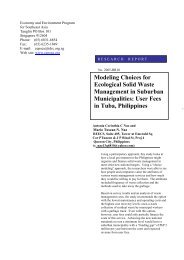systems research - the IDRC Digital Library - International ...
systems research - the IDRC Digital Library - International ...
systems research - the IDRC Digital Library - International ...
Create successful ePaper yourself
Turn your PDF publications into a flip-book with our unique Google optimized e-Paper software.
Short-duration rnungbean sown in April or May (before <strong>the</strong> main crop of<br />
rice in August) fits into <strong>the</strong> two-peak rainfall pattern of <strong>the</strong> country. However,<br />
mungbean is not recommended in low-lying areas of <strong>the</strong> ricefield where<br />
waterlogged conditions are likely to occur.<br />
Farmers who followed <strong>the</strong> recommended input levels for mungbean and<br />
rice obtained a gross margin of THB5,630/ha. This is about 100% higher than in<br />
fields where recommendations were not followed (Table 2).<br />
O<strong>the</strong>r promising technologies, such as jute before rice and kenaf before<br />
rice, were tested in four provinces in <strong>the</strong> nor<strong>the</strong>ast. The EEC- and USAID-<br />
funded projects in <strong>the</strong> area joined this project on <strong>the</strong> basis of <strong>the</strong>se two<br />
technologies.<br />
STUDY OBJECTIVES<br />
In 1988, <strong>the</strong> <strong>International</strong> Development Research Centre (<strong>IDRC</strong>), in coordi-<br />
nation with <strong>the</strong> <strong>International</strong> Rice Research Institute (IRRI), supported studies<br />
in several countries to investigate <strong>the</strong> impact of FSR. In Thailand, an impact<br />
study was conducted by social scientists from Chiang Mai University and Phayap<br />
University toge<strong>the</strong>r with personnel from <strong>the</strong> FSRI. The study area, amphoe Dok<br />
Kham Tai, Phayao, was selected under <strong>the</strong> guidance of <strong>the</strong> FSRI. The two<br />
mature technologies introduced by <strong>the</strong> Integrated Rainfed FR/D project were<br />
<strong>the</strong> subject of investigation. The main objective of <strong>the</strong> study was to determine<br />
<strong>the</strong> changes in productivity and income of farmers who adopted <strong>the</strong> new<br />
technologies in <strong>the</strong> rainfed areas of Dok Kham Tai. The specific objectives were<br />
to determine <strong>the</strong> level and extent of adoption of <strong>the</strong> new technology introduced<br />
in <strong>the</strong> project site and in neighboring areas; to estimate changes in net farm and<br />
household incomes resulting from <strong>the</strong> adoption of <strong>the</strong> new technology in relation<br />
to o<strong>the</strong>r sources of household income; and to examine <strong>the</strong> adoption of <strong>the</strong> new<br />
technology and its benefits to different groups of farmers.<br />
The study lasted 3 yr (1989-91). The first 2 yr were devoted to data<br />
collection and <strong>the</strong> last year to data analysis. Following <strong>the</strong> recommendations<br />
made during review meetings in Chiang Rai in November 1990, <strong>the</strong> study<br />
focused on <strong>the</strong> impact on institutions and communities. It was felt that without<br />
this aspect, impact assessment might be viewed as inadequate. Therefore, this<br />
study included <strong>the</strong> extent to which technologies and recommendations were<br />
adopted by extension officers and farmers; and <strong>the</strong> contribution of FSR to<br />
improvements in <strong>the</strong> capability of <strong>the</strong> <strong>research</strong> <strong>systems</strong> to meet <strong>the</strong> needs of its<br />
clients. However, greatest emphasis was given to <strong>the</strong> original objectives because<br />
this was <strong>the</strong> initial orientation of <strong>the</strong> study in 1989.
















